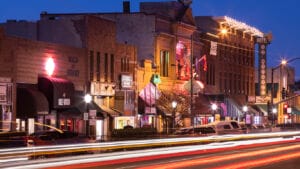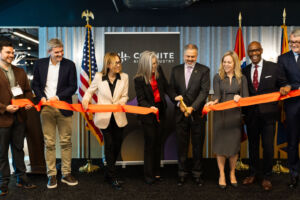Turmoil and controversy may have dominated national and international headlines in 2017, but for Phoenix, it was another year of steady, positive change. A stronger economy, a more sustainable city, and the pursuit of real opportunity for everyone.
Let’s look back at the results that shaped the last year and read the full year in review on Medium.
Phoenix Earns National Recognition
This year saw Phoenix — and its leaders — earn recognition for leading the way on some of the country’s most critical challenges:
- Governing Magazine named Phoenix Mayor Greg Stanton the Public Official of the Year among mayors for his work rebuilding the city’s economy and making key strides on sustainability. The publication also named Phoenix the nation’s most innovative city.
- C40 Cities Bloomberg Philanthropies honored ten innovative cities around the world for taking major climate action. Phoenix was recognized with a “Cities 4 Zero Waste” Award for its sustainability progress.
- U.S. Conference of Mayors recognized Phoenix with the 2017 City Livability Award for its forward-thinking mass transit plans.
- Phoenix earned the Arizona Forward Governor’s Award for Environmental Excellence in recognition of the landmark water agreement between the City and the Gila River Indian Community.
Phoenix Economy Continues to Boom
Investments the City made to turn the local economy into one rooted in knowledge and skills continue to pay off as indicators show that Phoenix is leading Arizona’s economic recovery:
- Average wages grew more in Phoenix than anywhere else in the nation — a whopping 7.6 percent. And the Phoenix metro unemployment rate plummeted to 3.7 percent, nearly a full point lower than the state’s.
- Phoenix ranked third in the country for high-tech job growth and became one of the nation’s top 10 fastest growing economies.
- Skills are driving the Phoenix economy as more than 60 percent of the workforce now hold jobs in advanced industries such as business and financial services, precision manufacturing, health and life sciences, and technology.
- More businesses are choosing Phoenix. This year, 32 new companies moved to the city, bringing more than 11,300 new jobs. Overall, metro area job numbers rose by 45,200 from last year.
- Trade with Mexico is up more than 150 percent since 2010 — now at more than $8 billion annually. To continue to strengthen the trade relationship with our southern neighbor, Phoenix opened its second Mexico-based trade office — in Hermosillo — in March.
Taking the Lead on Sustainability
As the federal government withdrew from its leadership role on combating climate change, Phoenix took the issue head on:
- Stanton, alongside mayors across the country, recommitted Phoenix to the goals of the Paris Climate Accord combating climate change and promoting sustainability.
- The City began to replace nearly 100,000 city street lights with energy-efficient LED bulbs — a task that will save millions of dollars and reduce electricity usage by up to 50 percent.
- Phoenix increased its recycling and compost volume 10 percent from last year, making the city’s total waste diversion rate 30 percent.
- The City entered a cutting-edge partnership — the largest of its kind in the country — with renewable energy company Ameresco to turn biogas from the 91st Avenue Wastewater Treatment Plant into green gas that can be sold for profit.
- With the help of Downtown Phoenix Inc., nearly 150 new shade trees and more than 500 new plants are making the downtown walking experience even better and growing our urban shade canopy.
Higher Education Partnerships Grow
Phoenix’s commitment to higher education continued:
- Phoenix, ASU and Mayo Clinic partnered to develop a site on the Arizona Biomedical Corridor in Desert Ridge that will become home to the 150,000 square-foot ASU Health Solutions Innovations Center.
- U of A’s Biomedical Sciences Partnership Building opened on the Phoenix Biomedical Campus — and ASU’s development is moving forward on the seven acres of land on the north side of the campus.
- In another Phoenix-ASU partnership, the ASU Thunderbird School of Global Management announced it would relocate to the downtown Phoenix campus.
Transportation Options Grow Throughout the City
The Transportation 2050 Plan, approved by voters just two years ago, had a significant impact on Phoenix transit:
- Construction began on the plan’s first capital project —a light rail station located on Washington Street near Ability 360 — with a special design aimed to be a model of accessibility for individuals with disabilities.
- Voter-approved funds allowed bus service hours to expand on Fridays, Saturdays and Sundays to match light rail service hours seven days a week. Ridership rose by 6.1 percent.
- Phoenix installed its first protected bike lanes on 15th Avenue between Van Buren and Jefferson streets — the first step in our long-term effort to build safer streets for bicyclists.
Staying True to Our Values
We continued our work to be a city that welcomes everyone and respects everyone, with an economy that creates real opportunity for everyone:
- Phoenix stood up to pharmaceutical companies and distributors whose fraudulent marketing helped create the opioid crisis — one of the deadliest drug epidemics in our nation’s history. In November, the City Council unanimously supported taking legal action against drug companies to demand accountability for the stunning rise in opioid addiction.
- Phoenix opened Starfish Place, the nation’s first long-term housing project for human trafficking victims and their children. The 15-unit housing complex offers on-site services and case workers to support its residents.
- The strategic action of the Opportunities for Youth initiative had a positive impact on young people in our community: the disconnected youth rate dropped a stunning 26 percent in the Phoenix area in the last year — the most significant improvement in the country.
- Phoenix earned another perfect score from the Human Rights Campaign’s Municipal Equality Index, which recognized ongoing efforts to make sure everyone in our community receives equal treatment regardless of how they identify or who they love.



